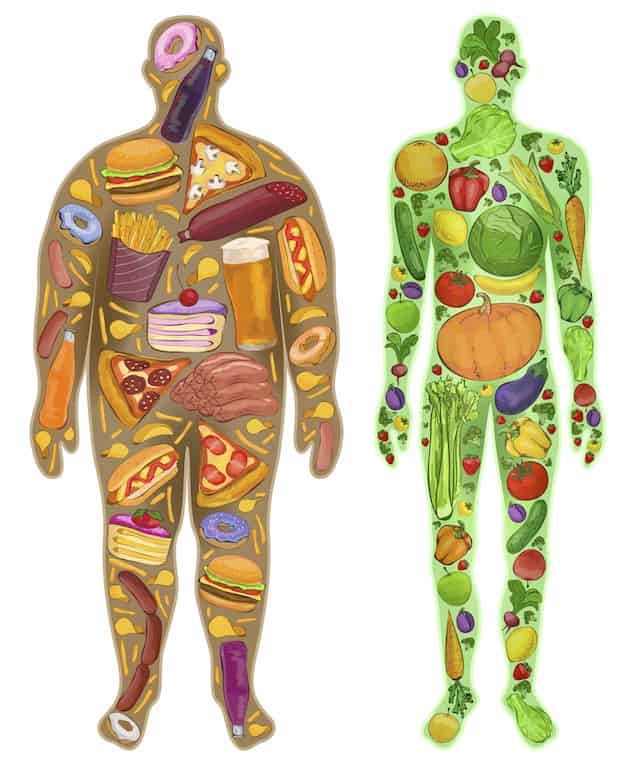If you're still counting calories: You can save yourself time and nerves. In a previous article we gave six reasons for this:
- Calories are not nutrients
- Not every calorie is created equal
- We clearly miscalculate
- Not everyone is the same
- Renunciation is not sustainable
- Counting does not replace healthy habits
You can (and should) read the full argument here.
I wasn't surprised that the article sparked divided opinions. A lot made sense to the readers, but without a "yes, but" it was not possible. Most calorie proponents argue that calories give us a sense of how much we are actually eating over an entire day. After all, people are often not aware of this. I think so too, but this argument ignores the real problem. Because it doesn't matter how much we eat. What matters is what we eat - and we cannot measure that in terms of calories. This is what the first two arguments of my earlier article address:
- Calories are not nutrients
- Not every calorie is created equal
I would now like to go into these in more detail because they are the real reason that counting calories do more harm than it does when it comes to weight loss.
HOW THE BELIEF IN CALORIES LEADS US ASTRAY
Calories have long been - and seemingly still are - the explanation for being overweight. The common belief is that the human body obeys the laws of thermodynamics: our weight will remain stable if we give off as many calories as we take in. If you want to lose weight, you either have to eat less or burn more energy through exercise. The expected weight loss can be calculated from the calorie intake minus calorie consumption.
According to belief, we have our own energy balance in our own hands. Simply give us an arbitrary recommended daily requirement of 2,000 kilocalories and write the energy contained on each food packaging. The exercise bike (or the smartwatch) shows how much energy we burn while cycling, jogging or walking: We can already work out for ourselves whether we are gaining or losing weight.

Calories are supposed to simplify our diet, but make it more complicated. It cannot be that we stay slim just by studying calorie tables and documenting our consumption. How else could humanity have survived without intelligent wristwatches and calorie apps without soon bursting? It is obvious that people are getting fatter, although they are better “informed” than ever about calories and the like.
Statistics also speak against the calorie myth. The average calorie intake has actually increased significantly over the past few decades. However, so clearly that people (theoretically) would have to be much thicker than they already are. According to a study by Kiyah Duffey and Barry Popkin, Americans consumed an average of 570 more calories a day in 2006 than in 1977. This is due to larger servings and the higher energy density of today's (processed) food.
For example, suppose that in 1977 the average American was eating according to their energy needs, and today they are consuming 570 more calories than they should. Then the average American would have to put on 29.7 kilograms each year (at 7,000 calories per kilogram of body fat). After ten years at the latest, there would be no average American anymore, because they would have long since died as a result of their excess weight.
Even if we calculate with smaller numbers, it quickly becomes absurd: If someone were to consume only 57 calories (half an apple) too many a day, they would have to have 30 kilograms too much on their ribs after ten years. There is something wrong!
HOW THE BODY REALLY DEALS WITH ENERGY
Calories don't matter. The energy is finally absorbed by the body and it has to do something with it. However, the conventional conclusions are wrong. An excess of energy does not automatically mean that we are gaining weight, and a lack of energy does not mean that we are losing weight. Both situations just mean that the body has to react to them in some way. How it does this depends on the quality of the energy source.
With a healthy diet, the body burns excess energy in the form of body heat. In addition, the urge to move increases, so that we burn additional energy without having to pull ourselves up. This effect is canceled out with unhealthy nutrition (more on this later).
If we consume less energy than the body needs, it reduces its energy consumption. Then we are tired and in a bad mood. It doesn't take long before he begins to lose additional muscle mass, as this consumes valuable energy. He holds onto the fat pads as a last reserve. If we starve long enough, the fat pads also melt. However, we immediately gain weight again (with an unhealthy diet), because the energy requirement is in the basement so that even a normal intake of calories is already too much. This is how the yo-yo effect is created.

Our body, therefore, knows what to do with excess and lack of energy. With a healthy diet, it neither increases significantly nor decreases when we change the amount of food we eat. He stays at his starting weight. This can be explained with the set-point theory, which I first read about in the book "The Calorie Myth" by Jonathan Bailor. According to this, everyone has a set-point weight that keeps our body stable, no matter how many calories we consume - as long as the quality of the diet does not change.
If you have a high setpoint, you store more fat. If you have a low set point, you stay slim. There may be short-term variations in weight (e.g. due to dieting), but in the long term, the body will always find its way back to its standard weight. The setpoint cannot be shifted through quantity, but solely through quality. If you eat less healthily, the setpoint (and the weight) increases. If you eat healthier, you will lose weight. The quantity is irrelevant in a healthy diet.
The setpoint theory would explain what had long fascinated me: How do many overweight people manage to maintain their weight for decades? Many fat people are just as heavy today as they were ten years ago. They try to change something through one diet or another, but by and large, they stick to their standard weight - because the quality of their diet has never changed.
I just kept getting fatter at the time. I would have been happy about a stable weight. But I also have to say that the quality of my diet was very poor. I only drank sweet drinks, ate a lot of sweets, and almost exclusively ready-made meals - and in large quantities.
At some point, I lost weight on a diet by drastically reducing the amount and also improving the quality of my diet (after all, I don't eat chocolate while on a diet). Then I gradually returned to my old diet but paid attention to the amount. I ate relatively unhealthily again, but less of it. It took a lot of willpower. I also exercised almost every day to stay slim.
Still, my weight slowly increased again. Even though I was mathematically (keyword: "counting calories" ) in the green, I could only watch helplessly as it got more and more. I felt my body weight want to go back up. After three and a half years, I had put on 12 kilograms again, despite doing so much exercise and eating in moderation. Until I improved the quality of my diet.
WHAT DEFINES THE QUALITY OF A CALORIE
Even before I read "The Carolrie Myth", I was convinced that what we eat is more important than how much we eat. I could see it in myself: When I cut down on sugar and ate hardly any processed foods, the pounds dropped on their own - no matter how much I ate. I feel the same effect when I reduce products containing cereals (bread, pasta, etc.).
Only later did I learn the theory behind it: Calories differ in their quality, which can be described by four factors:
- Saturation: How quickly do the calories fill us up?
- Aggression: How Likely are the Calories Stored as Fat?
- Nutritional value: How many vitamins, minerals, amino acids, fatty acids, etc. do the calories contain?
- Efficiency: How easily are the calories converted into fat?
Food with high satiety and lots of nutrients, but low levels of aggression and low efficiency, is therefore healthy. If you've been following our real food philosophy for a while, it won't surprise you that it is they that contain the highest quality calories. Vegetables, fruits, nuts, and seeds are the highest quality foods. They contain most of the nutrients, a lot of fiber, plus proteins and complex carbohydrates. In particular, we could eat green vegetables until we drop. Of which can not be thick.

Anything that contains easily digestible carbohydrates is problematic (poor quality). This includes almost all industrially manufactured products, sugary foods, and flour products (bread, pasta). The easily digestible carbohydrates go quickly into the blood as glucose. The pancreas then secretes large amounts of insulin, which transports the energy to the fat cells. Those who mainly consume this poor quality shift their set point higher and higher and can no longer permanently lose their weight without healthier foods.
WHAT DOES THIS MEAN FOR (D) A DIET?
It is always said that all food is okay as long as we consume it in moderation. It's a myth. Unhealthy foods are always unhealthy. The consequences are just not so devastating if we consume them in moderation.
Reduction alone will not lead you to success. You cannot stay slim permanently if you eat an unhealthy diet but you pay attention to the amount. Your body will always want to return to its set-point weight, which depends heavily on the quality of your diet.
In order to sustainably reduce body fat, you have to eat healthy foods and then stick to this diet. It must be so easy to implement in your everyday life that you can and want to pursue it forever. It must not be connected with coercion, otherwise, there is no point. Your willpower would weaken at some point.
It doesn't have to mean eating only green vegetables. We don't do that either. But you will have to find a compromise between mostly healthy eating and the occasional "sin" to reach a new set point weight that you are happy with.
I would like to close with a quote from another book - "China Study":
"Give your body the right food and it will do the right thing with it."